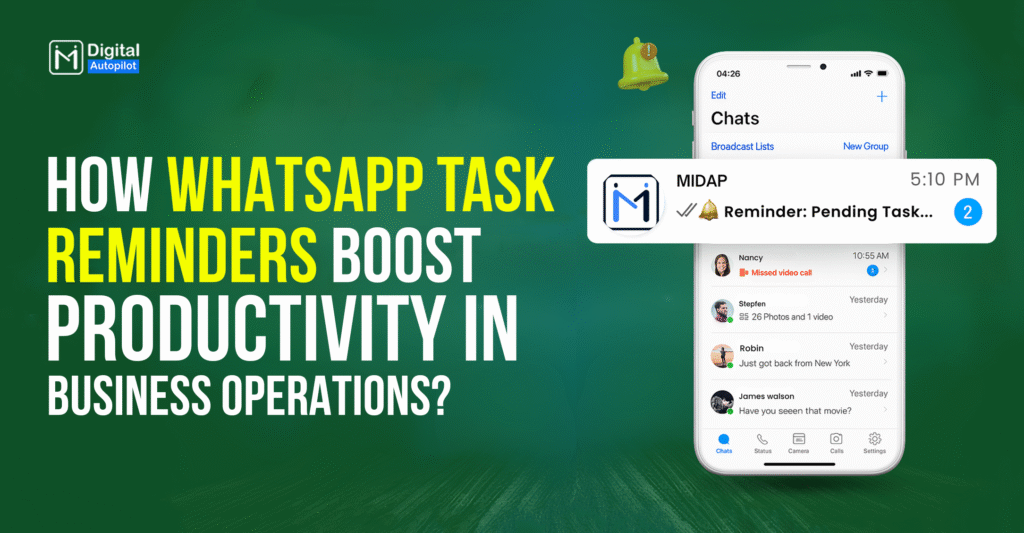How WhatsApp Task Reminders Boost Productivity in Business Operations

In every business, productivity is not destroyed by big problems.
It gets destroyed by small, invisible gaps:
- A purchase order that someone forgets to create
- A customer follow-up that no one remembers
- A delivery update that never reaches the client
- A task that was assigned verbally and lost in memory
Most businesses lose time, money, and reputation because of these “small” gaps.
Every business owner has faced this — you assign the work, the team agrees, but daily calls, urgent issues, and routine pressure push the task out of everyone’s mind.
That single forgotten task creates delays, misunderstandings, and in many cases, financial loss.
Employees don’t intentionally ignore tasks. Human memory is unreliable. People get distracted. Work piles up.
This is exactly where WhatsApp becomes an unexpected hero.
Instead of asking employees to check complicated project software or open long email threads, WhatsApp task reminders bring the task directly to the place where every employee is already active. No new app, No learning curve, No excuses.
Why WhatsApp as a Reminding System Works Better Than Any Other Software
Almost every company tries using emails, task sheets, dashboards, or dedicated project management tools.
The problem is not the software — the problem is human behaviour. Employees don’t open dashboards every hour. Emails are missed. Apps are ignored after a few days.
But people open WhatsApp many times a day, which means WhatsApp task reminders become impossible to miss.
They show up on the same platform where employees talk to customers, managers, and colleagues, making them natural, familiar, and immediate.
Most productivity tools fail because they demand a behavioural change. WhatsApp reminders succeed because they fit into existing behaviour.
The Psychology Behind WhatsApp Task Reminders System
Human motivation works in a simple way:
- When a task stays visible, we finish it.
- When it disappears from our sight, we forget it.
WhatsApp maintains constant visibility.
A reminder feels personal.
It feels like someone is talking directly to you.
This increases the completion rate up to 70–90% compared to emails or apps.
How WhatsApp Task Reminders System Improve Work Discipline Day by Day
In many businesses, managers assign tasks verbally or casually during calls. Once the call ends, the responsibility depends entirely on memory.
When tasks reach employees as WhatsApp reminders, the responsibility becomes visible. Employees can no longer say “I forgot” or “I was not informed,” because the reminder sits right in their WhatsApp chat with the task details, timeline, and instructions.
This naturally creates accountability without arguments or pressure.
With regular reminders, employees start checking pending tasks on their own, updating completed work, and planning their day better because the system keeps them alert.
Discipline grows not because someone is shouting, but because the system keeps everyone organized.
PEOPLE ALSO READ THIS: #1 Brutal Reason Why Indian Businesses Are Losing Customers (How to Fix It)
Deep Practical Benefits of WhatsApp Task Reminders System
✅ 1. Reduces Cognitive Load for Employees
People can only remember a limited number of tasks at a time.
In busy environments, memory collapses.
WhatsApp task reminders:
- Release mental pressure
- Remove dependency on memory
- Keep employees mentally free
A mentally free employee performs better than a mentally overloaded one.
✅ 2. Ensures Task Continuity Despite Interruptions
Every business workflow faces interruptions:
- client calls
- urgent requests
- sudden visitors
- breakdowns
- meetings
Employees pause tasks.
Many never return to them.
WhatsApp task reminders bring back forgotten tasks without needing a manager to chase them.
✅ 3. Strengthens Accountability
Most businesses struggle with this:
“Who was responsible?”
When tasks and reminders go on WhatsApp, proof exists:
- who got the task
- when it was assigned
- what deadline was given
- whether reminder was sent
- what status update was shared
There is no space for excuses.
✅ 4. Eliminates “I thought someone else was doing it”
In companies where multiple people handle similar work, tasks often become invisible.
WhatsApp reminders directly mention the responsible person.
Responsibility becomes personal.
This simple shift increases ownership.
✅ 5. Better Internal Communication
Calling employees every time creates friction.
WhatsApp reminders feel normal, not stressful.
Instead of:
❌ “Why didn’t you do it?”
✅ “Reminder: Task pending”
Employees respond without feeling attacked.
✅ 6. Faster Decision Making
When tasks are updated on WhatsApp:
- managers get instant status
- no need to wait for meetings
- decisions move faster
- next steps begin quickly
Speed becomes a habit inside the business.
✅ 7. Integrates With Real Business Workflow
Most business workflows already depend on WhatsApp:
- customer inquiries
- supplier coordination
- delivery updates
- approvals
- confirmations
Adding task reminders to the same platform keeps everything in one place. No new system to learn.
Financial Impact of Reducing Forgotten Tasks
Even a small forgotten task has a hidden cost. A late reminder to a vendor can delay stock and stop production.
A missed follow-up can lose a customer forever. A forgotten approval can delay billing and cashflow.
When WhatsApp task reminders prevent these small failures, the business saves time, reduces loss, and improves overall efficiency without investing in expensive infrastructure.
Why WhatsApp Task Reminders Are a Better Fit for Indian Businesses
Indian businesses run on speed, phone calls, and instant communication. People are comfortable with WhatsApp.
This makes WhatsApp a natural environment for task reminders. Employees don’t resist it. Even less tech-friendly staff respond quickly because the platform is familiar. This solves one of the biggest barriers in digital adoption — training.
So, How Does a Business Automate WhatsApp Task Reminders?
Manually sending reminders is impossible after a certain scale. No business owner can message every employee every day. To make reminders automatic, businesses use systems like MIDAP (Mi Digital Autopilot).
MIDAP assigns tasks, sends WhatsApp task reminders automatically, you can set priorities against tasks, tracks deadlines, asks for status updates, and maintains proof of completion — all inside WhatsApp without asking employees to learn any new software.
This is why companies across manufacturing, trading, construction, FMCG, logistics, real estate, and service industries are moving to WhatsApp-based task management. It is simple, fast, and naturally fits into daily work life.
Businesses using MIDAP notice:
✔ faster task completion
✔ less follow-up workload
✔ happier customers
✔ more organized operations
✔ reduction in mistakes
✔ more productive staff
It is a silent system that keeps everyone accountable without effort.
Conclusion
Productivity does not improve when people are pressured. It improves when systems support them.
With WhatsApp task reminders system, tasks stop falling through the cracks, employees respond faster, customer experience becomes smoother, and operations stay organized without constant follow-ups.
And with automation platforms like MIDAP, this entire reminder and tracking process works automatically, every single day, without depending on memory, mood, or manpower.
Ready to Build a System-Driven Business With WhatsApp Task Reminders System?
Stop chasing employees for updates.
Stop relying on verbal follow-ups and memory-based task handling.
Start building automated processes that work — even while you sleep.
👉 Book a Free Demo with MIDAP today
and see how smart automation and WhatsApp Task Reminders can shift your business from people-dependent to system-driven, with zero micromanagement.




